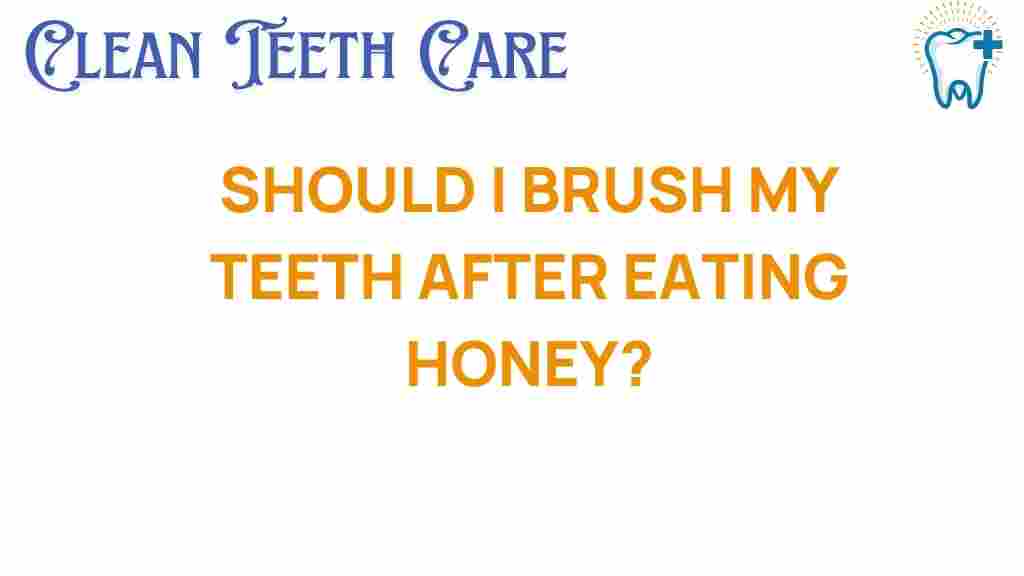The Sweet Dilemma: Should You Brush After Eating Honey?
Honey is often touted as a natural sweetener with numerous health benefits, making it a popular choice for many. However, when it comes to oral hygiene, the question arises: should you brush your teeth right after enjoying honey? In this article, we will explore the effects of honey on dental health, the importance of brushing teeth, and practical tips for maintaining oral hygiene while enjoying this sweet treat.
Understanding Honey and Its Health Effects
Honey is not just a delicious sweetener; it also boasts various health benefits. Rich in antioxidants, vitamins, and minerals, honey can support overall health. Here are some of the notable honey health effects:
- Antioxidant properties that help combat oxidative stress
- Antimicrobial effects that may aid in wound healing and fighting infections
- Potential to soothe sore throats and improve digestive health
However, honey is also high in natural sugars, which can impact your dental health if proper care is not taken. This brings us to the importance of oral hygiene, especially when consuming sugary substances.
The Sugar Impact on Dental Health
When it comes to dental care, understanding the sugar impact on oral health is crucial. Sugars, including those found in honey, can contribute to tooth decay. Here’s how:
- When sugar is consumed, it interacts with bacteria in the mouth, creating acids.
- These acids can erode tooth enamel, leading to cavities.
- Without proper brushing teeth habits, this decay can progress, leading to more severe dental issues.
Therefore, it’s essential to consider your dental care routine after enjoying honey or any sugary food.
Should You Brush After Eating Honey?
The answer to whether you should brush your teeth after eating honey isn’t straightforward. Here’s a step-by-step process to help you decide:
1. Wait Before Brushing
After consuming honey, it’s advisable to wait for about 30 minutes before brushing your teeth. This allows time for your saliva to neutralize the acids produced by the sugar and helps to remineralize your enamel.
2. Rinse Your Mouth
Instead of brushing immediately, rinse your mouth with water to help remove any residual honey. This simple step can significantly reduce the amount of sugar that remains on your teeth.
3. Consider Your Overall Oral Hygiene Routine
Incorporate honey into a balanced diet, but be mindful of your overall oral hygiene routine. If you consume honey frequently, ensure you maintain regular dental check-ups and cleanings.
Health Tips for Enjoying Honey
To enjoy the benefits of honey while protecting your teeth, consider these health tips:
- Use honey as a substitute for sugar in recipes, reducing the overall sugar intake.
- Pair honey with foods that are high in fiber, such as whole-grain bread, to help mitigate sugar absorption.
- Choose raw, unprocessed honey, which retains more nutrients and may have additional health benefits.
- Practice good dental hygiene by brushing twice a day and flossing regularly.
Common Misconceptions About Honey and Dental Health
There are several myths surrounding honey and its effects on teeth. Here are a few common misconceptions:
- Myth: Honey is naturally antibacterial, so it won’t cause cavities.
- Truth: While honey has antimicrobial properties, it is still a sugar that can contribute to tooth decay if not managed properly.
- Myth: You can brush your teeth immediately after consuming honey without any issues.
- Truth: Brushing immediately can damage enamel softened by acid; it’s better to wait.
Troubleshooting Tips for Maintaining Oral Hygiene
If you find yourself struggling with your oral hygiene routine after consuming honey, consider these troubleshooting tips:
- Set a timer: Use a timer to remind yourself to wait before brushing.
- Carry a water bottle: Rinse your mouth with water after enjoying honey, especially when on the go.
- Seek professional advice: If you have ongoing concerns about dental health, consult with your dentist for personalized advice.
Conclusion
In conclusion, while honey is a natural sweetener with various health benefits, it’s crucial to be mindful of its impact on dental health. The answer to whether you should brush your teeth after eating honey is not a simple yes or no. By waiting to brush, rinsing your mouth, and maintaining a consistent oral hygiene routine, you can enjoy honey’s sweetness while protecting your smile. Remember, moderation is key, and being proactive about cavity prevention and dental care will help you maintain optimal oral health.
For more information on dental care and nutrition, check out this helpful resource.
Embrace the sweet taste of honey, but don’t forget the importance of your brushing teeth routine!
This article is in the category Hygiene and created by CleanTeethCare Team
